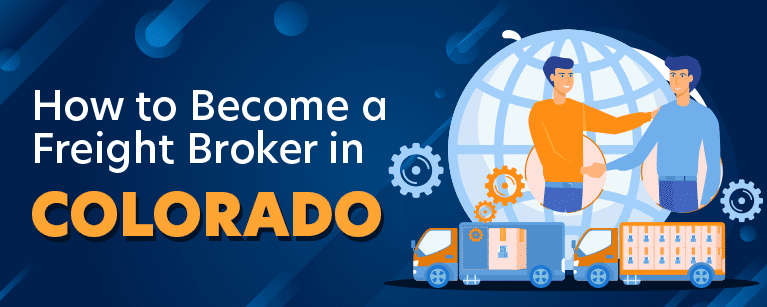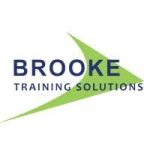
Are you looking to start a rewarding career right out of high school without having to go through extensive training?
As a freight broker, you can set up an office quickly, start working, get licensed, and make a steady cash flow.
Here is what you need to know about becoming a freight broker in Colorado, including a step-by-step guide for your licensing.
Table of Contents
Freight Broker Duties in Colorado
As a freight broker, you’ll have many duties that you must complete to satisfy your clients’ needs.
These typically focus on making sure that goods are successfully transported from the shipper to the receiver and verifying all arrivals.
Just a few things that you need to do when you pursue this high-quality and exciting career include:
- Setting up shipping routes between each of your clients
- Identifying and verifying all shipments before they begin
- Managing any emergencies that might occur during shipping
- Giving good customer support that ensures your clients are satisfied
- Keeping documents up-to-date between your shipping clients
- Producing sales leads for a company to keep them solvent
- Tracking all shipments and ensuring success
- Creating a shipping network that works for your clients
Licensing Requirements to Become a Freight Broker in Colorado
Do you need to take college classes to become a freight broker in Colorado?
No, which is useful if you’d rather just jump right into a career without having to pay a lot of money or go through extensive training.
Instead, you can get licensed right out of high school and start working with a freight brokerage firm or start your own.
Here’s what you need to do:
- Contact the U.S. Department of Transportation’s Federal Motor Carrier Safety Administration
- Sign up for a DOT number with them in person or online to begin your licensing
- Apply for a license with the FMCSA by paying $300 to start the process
- Prove that you have a $75,000 surety bond available for your business
- Showcase that you have adequate cargo and general liability for your firm
- Highlight that you have a freight agent in each state where you’ll operate
- Pay a $50 filing fee for filing your license on top of the initial $300
- Wait 4-6 weeks to see if your application is approved
- Once it’s approved, you can either start working or earn a certification
A Certified Transportation Broker or CTB certification isn’t technically required by Colorado or even the federal government.
However, it can be a rewarding thing to obtain because it can help you stand out compared to others in your field.
Just a few benefits of getting a high-quality CTB certification before starting your freight broker business include:
- Standing out compared to other potential businesses or brokers in your field
- Potentially earning more money when finding a job with a brokerage firm
- Learning more about freight brokerage when studying for the exam
- Proving that you have the skills necessary for this career
Transportation Intermediaries Association or TIA members pay just $675 for registration fees and $375 for the exam.
If you don’t join, you pay $800 for registration and $525 for the exam.
So, while you don’t need to be a member of TIA to get certified, doing so can save you money.
Furthermore, you can also potentially meet business partners or find a job more easily.
Freight Broker Programs in Colorado
Here are a few freight broker training options that you can take if you live in Colorado:
Colorado State University
Provides an online course in freight brokering that teaches you about the laws and business practices of this field
Brooke Training 
Is an online freight broker training team that provides education in this field all across the nation
Freight Broker Schools in Colorado – Summary Table
| School Name | Address |
|---|---|
| Colorado State University | Fort Collins, CO 80523, United States |
| Brooke Training | 120, 5005, 5005 Colleyville Blvd #120, Colleyville, TX 76034, United States |
Salary for Freight Brokers in Colorado
Freight broker salary averages can be misleading because many brokers make very good money while others struggle.
For example, the typical salary range is between $33,356 to $37,673 with a median of $35,496.
That said, you can potentially make far more money if you build strong connections with your clients and branch out into long-term contracts and bonus packages.
Annual Salary Range:| Location | Avg. Annual Salary |
|---|---|
| Denver | $48,721 |
| Colorado Springs | $47,714 |
| Aurora | $48,689 |
| Loveland | $46,955 |
| Fort Collins | $47,019 |
| Arvada | $48,721 |
| Pueblo | $44,986 |
| Westminster | $48,721 |
| Boulder | $49,157 |
| Thornton | $48,721 |
Regional Salary in Colorado
| Region | Employed | Avg. Annual Salary | Avg. Hourly Pay | Top 10% Annual Salary | Bottom 10% Annual Salary |
|---|---|---|---|---|---|
| Denver-Aurora-Lakewood, CO | 630 | $51,600 | $24.81 | $66,910 | $44,340 |
* Employment conditions in your area may vary.
Frequently Asked Questions
Is This a Good Salary for Colorado?
Compared to the $76,000 average salary in Colorado, a freight broker career might not seem that rewarding.
However, you’ll typically have far fewer training expenses and can make a higher salary if you’re willing to work hard and expand your business.
As with many businesses, the harder you work, the more potential income you may make.
Do You Have to Pay to Renew Your License?
Yes, you have to pay relicensing fees regularly to keep your business in operation.
Typically, you pay yearly, though you may also pay on other schedules.
You’ll pay about $300 to maintain your license throughout the business year, so make sure you stay on top of your fees in this way.
Should I Start My Own Business?
While you could work as a freight brokerage agent for another firm, it’s often a better idea to start your own business.
That’s because your potential income will increase, and you can expand to more clients and even into other states.
That said, your risk increases when you start a business, so make sure that you’re comfortable with that tradeoff before starting.
Freight Broker Info by State
- Alabama
- Alaska
- Arizona
- Arkansas
- California
- Colorado
- Connecticut
- Delaware
- Florida
- Georgia
- Hawaii
- Idaho
- Illinois
- Indiana
- Iowa
- Kansas
- Kentucky
- Louisiana
- Maine
- Maryland
- Massachusetts
- Michigan
- Minnesota
- Mississippi
- Missouri
- Montana
- Nebraska
- Nevada
- New Hampshire
- New Jersey
- New Mexico
- New York
- North Carolina
- North Dakota
- Ohio
- Oklahoma
- Oregon
- Pennsylvania
- Rhode Island
- South Carolina
- South Dakota
- Tennessee
- Texas
- Utah
- Vermont
- Virginia
- Washington
- West Virginia
- Wisconsin
- Wyoming









